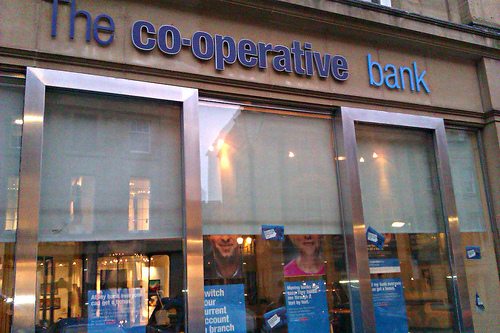

Economy
We’re still ethical, says Co-op Bank chief after unveiling rescue plan
The Co-operative Bank has unveiled measures to overcome the £1.5 billion shortfall in its balance sheet, but has been urged not to surrender its ethical values in the process.
For the first time in its 141-year history, shares in the mutually-owned bank will be floated on the stock market through a so-called ‘bail in’ process. This will see the bank offer bondholders shares in an effort to raise capital.
It is aiming for £1 billion this year and £500m in 2014. Co-op Group chief executive Euan Sutherland said the news means the group “can now look to the future with confidence”.
But the Co-op’s announcement has led many to question whether the ownership structure and core principles of the largest ethical bank in the UK will change as commercial investors take on stakes. However, speaking to BBC Radio 4’s Today Programme on Monday, Sutherland insisted there would be “no change to our ethos or the way we run our bank”.
This is something backed up by other members of the alternative finance industry.
“The Co-operative Bank has been an ethical pioneer in banking and one of the reasons it has been able to stand out is that it is owned, ultimately by its customers. The new capital injection doesn’t change that”, said Ed Mayo, secretary-general of trade body Co-operatives UK.
“It is true that it is expected to involve the issue of a minority of shares to outside investors, but this is a model that has been tried in different co-operative settings around the world and there are good lessons on how to make a success of this.
“These moves ensure a substantial financial cushion that can underpin commercial success and the ethical values that have underpinned that. British banking as a whole is better off as a result of these actions to safeguard the Co-operative Bank.”
The Co-op Bank’s problems came to light after the collapse of a deal to buy 632 Lloyds branches in April – a deal that was lauded as “the biggest shake-up in high street banking in a generation” and which would have seen the bank treble in size. As it was, former Co-op Group chief executive Peter Marks said the transaction posed too high a risk.
The Guardian reported on Saturday that Lloyds customers were unhappy with being dumped. The banking group had instead decided to offload the 632 branches to the highest bidder.
Speaking to the BBC about the Co-op Bank’s bail in decision, Martin Shaw, chief executive of the Association of Financial Mutuals said that customers “will not see any difference”.
Meanwhile, Laura Willoughby, chief executive of campaign group Move Your Money, said, “It’s great news for customers and the economy that they have found a solution to their problems without resorting to the public purse.
“As the biggest ethical bank they provide choice and demonstrate that banking can be different. If a solution does threaten their mutual and ethical status then we call Co-op Group members to step-up and question the bank about what this really means.”
Further reading:
Co-op Bank faces uncertain future as deal to buy Lloyds branches collapses
Big five’s banking monopoly at risk, with 2.4m closing accounts in 2012
Co-op Bank image takes a hit after FSA fine


 Environment12 months ago
Environment12 months agoAre Polymer Banknotes: an Eco-Friendly Trend or a Groundswell?

 Features11 months ago
Features11 months agoEco-Friendly Cryptocurrencies: Sustainable Investment Choices

 Features12 months ago
Features12 months agoEco-Friendly Crypto Traders Must Find the Right Exchange

 Energy11 months ago
Energy11 months agoThe Growing Role of Solar Panels in Ireland’s Energy Future



























